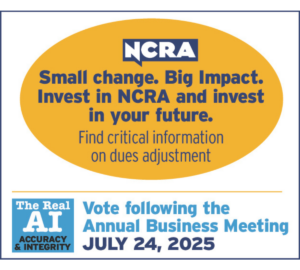 Because such a high percentage of court reporters are self-employed or run small businesses, it is not surprising that in any member needs assessment we conduct, we hear from a fair number of folks who are seeking low-cost health insurance. Having run a small business myself for a few years, I had to purchase health coverage for my family during that time, so I know first-hand that the costs to do so as an individual or as a family can be exorbitant.
Because such a high percentage of court reporters are self-employed or run small businesses, it is not surprising that in any member needs assessment we conduct, we hear from a fair number of folks who are seeking low-cost health insurance. Having run a small business myself for a few years, I had to purchase health coverage for my family during that time, so I know first-hand that the costs to do so as an individual or as a family can be exorbitant.
It is beyond unfortunate that the political debate surrounding the launch of the Affordable Care Act, commonly known as “Obamacare,” has served to confuse — rather than to explain — the impact of the new laws on individuals. Indeed, that political landscape made me think twice about whether I should focus a column on this important issue at all. That approach, however, would be a disservice to you, the membership.
Politics aside, let me suggest to those members who have been looking for affordable healthcare coverage for yourself and/or your family, Obamacare, which takes effect January 1, 2014, provides you with the answer. In January, in each state and the District of Columbia, exchanges will go into effect that will allow you to purchase individual and/or family healthcare coverage at rates that individuals likely could not get on their own. This coverage will be provided by health insurance companies that choose to offer programs to those individuals who join the exchange. You likely have heard that a number of state governments, 35 actually, have decided not to operate such exchanges. In those cases, the U.S. government will operate the exchanges, but the net effect for the individual is the same. There will be an exchange in your state that you can join and from which you can get health insurance at a lower rate than you could get on your own.
Keep in mind that you still will have many options at your disposal that will affect rates. Bronze programs with higher deductibles and fewer bells and whistles will cost less; silver, gold, and platinum programs with lower deductibles and more bells and whistles will cost proportionally more.
Some people will be justifiably skeptical and will ask how all this is possible. In the past, insurance companies have generally assumed that if you are seeking healthcare coverage as an individual or as a family, you are doing so to address a pressing health concern, meaning there would be significant financial risk to offer coverage to that person or family. So they jacked their rates for that individual or family even if there was no evidence of pre-existing conditions. If there was a documented pre-existing condition involved, the rates would be even more expensive. It now will be illegal for health insurance companies to discriminate against the individual/family in terms of rates, even in the case of there being pre-existing conditions. Effectively, the exchanges—with many thousands of individuals and families enrolled—allow for the insurance companies to distribute their financial risk across a large pool. The thinking here is that with substantially more younger individuals paying for coverage, those premiums will offset the costs of those who are older or who have pre-existing conditions, with the younger crowd costing substantially less for the insurance companies to cover.
All that said, there is no requirement for you to participate in an exchange. If you already have healthcare coverage with which you’re satisfied, say through an employer, you can keep it. Or, if you simply don’t wish to purchase health coverage at all, you can do so; however, you will be assessed a new penalty, which you will pay through your annual tax return. This penalty will be calculated based on a number of factors, but mainly on individual/family income.
Even in trying to offer a simplistic explanation of what will transpire with regard to implementation of the Affordable Care Act, things get complicated. I strongly encourage you to develop an understanding of how things will work in your own state based on your personal circumstances. There are any number of places you can go to develop such understanding, but please be careful that you are dealing with a trusted source of information such as www.healthcare.gov. By the way, the deadline for enrollment to have new coverage begin on Jan. 1 is Dec. 17.









